#i understand this is likely not the most common interpretation of his arc
Explore tagged Tumblr posts
Text
thinking a lot tonight about my favorite hickey interpretation which is that he is essentially a failed religious fanatic. to Me it is so much more compelling if he genuinely reveres the tuunbaq. he doesn't want to dominate it, he wants to worship it, or exist alongside it. he is deep in delusion and truly believes he has a genuine connection to it. he thinks that if he sacrifices the remaining men he has under his control to it, the tuunbaq will accept him as a follower. he has always believed himself separate to britain and its empire, an exception to its corruption. he believes that using the imperialist system to get away from the imperialist nation he hates makes him different than those who use the imperialist system to carry out explicitly imperialist endeavors. he thinks his past actions are inconsequential, thinks his resentment exempts him, thinks denouncing britain and allowing the tuunbaq to kill his crew will win him the respect and acceptance of this godly creature. but it doesn't. he isn't different. the pain he has caused for his personal pursuits is just as damaging as pain caused for grander, imperial pursuits, and is in fact the same thing. he is just as much a force of destruction as anyone else, just as much a target of the tuunbaq's rath as anyone else. perhaps more than anyone else. he lived his life hating britain, yet he still exhausted his endless quest for connection and purpose within the british framework before looking outside of it. he thought crozier saw things the way he did, recognized the same things he did, and he played the imperialist game as he saw it to be (abusing native people), attempting to chase that connection. but when crozier came up lacking and he came up brutalized, he stopped trying to find it there. he thinks instead that the tuunbaq sees him, recognizes he is different in a way crozier never did, can give him the soul bonded Purpose that he so deeply craves. he is genuinely mystified by it, sees it as so much larger and holier than anything britain has ever offered, and thinks it respects him the same way he respects it. tuunbaq killing him is much the same as crozier lashing him. he committed acts of violence to appeal to both of them, thinking it would win him their respect and admiration, only to end up as a subject of their violence in return, because he isn't what they want and he is never able to truly connect with people in the way he wants
#i understand this is likely not the most common interpretation of his arc#and likely not the most “correct”#but i find it far more compelling and nuanced than him simply being antagonistic and aggressive for the sake of it#in myyyyy opinion. personally#girl god doesn't see you you're just dehydrated!!!!!!#i often think of adam nagaitis saying hickey craves deep connection with people and values truth over everything else#he wants to understand people wants to know who they really are how they really feel what they really want etc#want to manipulate and persuade vs need to understand and be understood strikes again. duck shaking head smoking gif#something about his tendency towards violence being bred into him By the imperialist framework#he turns to it and uses it because it's all he knows#and yet it only ever lets him down because of course it does#i really love the way the terror shows imperialism as such a mutually destructive thing that serves no one except itself#ah. this show so good. who knew#cornelius hickey#francis crozier#the tuunbaq#the terror#the terror amc#the terror 2018#the terror meta
52 notes
·
View notes
Text
The Side Job: an episode where we come full circle, and full circle has always meant Parker
So so so full of spoilers - read at your own risk.
"I don't feel things the way other people do, so I was using their feelings to look at mine. Everyone kept asking me why I was doing this, but they wouldn't let me answer. They just kept guessing why I was doing it. Always my feelings, through them. And then I thought, 'Do I even know what I want?' So I had to get away. Because I do have feelings. One a lot...anger...Because when I was younger...Anyway, now I'm strong and you're weak. So what am I going to do and why am I going to do it?"
People likely have been doing this to Parker her whole life. But let's focus on this episode. Everyone in this episode tries to understand Parker, but their understanding is informed by who they are as people (and, for those who have known Parker longer, it's informed specifically by common touchstones in their history).
With one notable exception. But before we get there, let's talk about everyone else first. The show sets this up in order of decreasing permeability of boundaries.
Sophie comes first, and while Sophie and Parker's relationship is allowed several lenses in the Leverageverse (I've written about this here), maybe more than anyone else's, I think it's significant that right before their major interaction of the episode, we are presented with Harry's struggle with boundaries with his mother. Sophie's come a long way from last season's "Everything I do is from them" line of thinking, but she's always going to feel a little responsible for Parker, Hardison, and Eliot.
And so Sophie guesses it's because Parker doesn't want to deal with well thought-out plans every once in a while and wants the adrenaline of not having everything planned out. This makes sense because this is Sophie's style of masterminding. The entire first episode of Redemption season 2 deals with this. This is not to say that Sophie has bad boundaries with Parker. Just the boundaries in their relationship are more permeable than anyone else's. This is made clear by the way that Parker ropes Sophie in (or the way that Sophie presents herself to be roped in, intutitively).
Breanna guesses it's because Parker wants to change up the way that they do cons, which is a reflection of how she has new ideas and, like her brother, is drawn towards a slightly different style of work than the rest of the crew. Breanna does bring a new energy to the crew, and it's actually that energy that helps Parker out of her rut in s1. It also challenges her.
Harry guesses it's because Parker wants to use this experience to see if it's possible to change, if change is possible in general. And like, that's Harry's entire arc on the show (he doesn't have as much material to draw from...but like yes if you were to sum it up in a sentence, that'd be it).
I think it's important to note that no one here is completely wrong. They all have pieces of the truth. That's why Parker replies, "Something like that." to each of them. Parker is in fact taking a risk (how calculated the risk is left up for our interpretation, but on Leverage, the best cons are based in truth, and we are told that over and over again), trying something new, and testing herself.
Sophie and Parker have always been able to bond over the adrenaline rush of a job and a plan made up on the fly. Parker's risks tend to be more physical, and Sophie's tend to be more emotional. But their most significant beats involve this concept. (Sophie using a rig to get Parker off the roof in exchange for the David, "Maybe that's why they call it falling in love," Parker willingly stepping back into pure theft on this specific team and letting Sophie call the shots).
The new energy Breanna brings to the team does help Parker rediscover her passion and get in touch with a different side of herself.
The parallel in Harry wondering if change is possible and Parker, Hardison, and Eliot's "we change together" is directly referenced in Harry and Parker's scene.
So who's the exception? It's Eliot. Eliot doesn't offer up anything, even a piece, of what's going on with Parker. He just holds up a mirror and affirms her choice, referencing their shared history but never once deviating from that affirmation. It's not that he isn't worried about her - he clearly is, almost as much as Sophie. He just knows what she needs.
Speaking of Sophie, let's go back to a moment with her, because it speaks volumes, especially on a rewatch.
Harry: You don't trust Parker? Sophie: With my life? Always. With her life? Usually.
It's a lovely statement, right? It speaks to the depth of their relationship and how Sophie really cares for Parker. And it's also not really what Parker needs right now.*
*It's also not something that makes Parker upset. Parker has a very good understanding of the people around her and the way that they relate to each other. As Sophie points out, she doesn't shut them out and actually makes use of this in her plan! And she also knows that this is part of the reason why not everyone can be around when everything comes down to the wire. After a long time with our families, we get used to the way they do things. It's never completely good but it's also never completely bad. It's the way it is.
Eliot, who ran red lights to stop Parker from maybe killing a guy rolling Nanas, knows what Parker needs right now. And that's someone who has her back. And also has some distance between them.
(Hardison isn't in this episode much, but it's significant that Parker's entire self-examination is prompted by him.)
And finally (because I've gone on way too long, but you all indulge me sometimes, so I'm going to keep going until I'm finished), let's talk about Parker's only other significant relationship, which is present in this episode even though the character is no longer on this mortal plane.
Like, it's Nate, right?
Nate, who also had one emotion a lot: anger. Same as Parker! Nate, whose decision to make Parker his heir was made with input from the whole team (whether or not they were aware). Nate, who trusted Parker's judgment but also backed that reasoning up by saying that she didn't get emotional. Nate, who never fully understood Parker but like so many others close to her, understood pieces of her. And that was enough.
In many ways but not all, Parker was raised by and informed by Nate. She is not Nate. She doesn't have his upbringing or his baggage. Eliot makes that crystal clear.
I feel like a broken record, but it bears repeating. Leverage is a story about Nate. It is also a story about Parker.
And Leverage: Redemption is a story about Sophie. It is also a story about Parker.
One common thread: Parker.
What Parker decides to become and do is the most important question of the Leverageverse. Always has been!
Actually, in their respective stories, Nate and Sophie both address this in episodes that are EXTREMELY THEMATICALLY SIMILAR.
Archie: I made her unique. What is she now? Nate: I have no idea what Parker is now. I doubt she knows. (Leverage, The Inside Job, 3x03)
In both episodes, the answer involves them having no idea. However, the vibe is that they're both supportive of her figuring that out for herself.
Sophie: She's been three steps ahead of you the entire time. And you gave her 30 minutes to set it up. Alexandra Bligh: To set what up? Sophie: I honestly don't know.* But it's going to be fun. (Leverage Redemption, The Grand Complication Job, 3x05)
*Okay, Sophie is a professional liar. She sort of kind of knew what Parker was doing in this situation because she was stalling so Parker would have time. It is however on theme. We know Sophie loves a theme.
Leverage ends with Parker repeating Nate's speech from the pilot, which is basically the thesis statement for the show, the explanation for what they do.
The Side Job ends with Parker answering why she does what she does. (It's also why the team does what they do, but for Parker, this is deeply, deeply tied into who she is as a person.) Redemption means being the best version of herself and helping other people, and for Parker, that's intimately linked to her doing crime. And she expresses that - in word and action - in a very Parker way.
This show is famous for treating every season finale like it's the end of the show. I deeply crave more Leverage, but if this was the last episode we ever get, it's a pretty damn good place to end.
#leverage redemption#leverage redemption spoilers#leverage#parker#nate ford#sophie devereaux#eliot spencer#breanna casey#harry wilson#alec hardison#the side job#the inside job#the grand complication job#theft as a love language#I trust your judgment#that's what makes us us#otp: pretzels#ot3#I'm so exhilarated I genuinely am concerned about my ability to function#this show is truly transcendent#it's not even on the same plane#no one is doing it like them
363 notes
·
View notes
Text
Okay as promised earlier, a post about Marty McFly and gender.
The reason I find a trans reading of Marty specifically so compelling beyond some of the superficial things--like the fact that he's smaller and wears a lot of layers and generally looks the way a lot of younger trans men do--is because if you interpret him as trans, there are other parts of his character that become extremely interesting.
Because, like, Marty is a decent guy. I am not the first to comment on the fact that, when compared to a lot of other young, male 80s protagonists especially, he comes across as much kinder & more empathetic, generally a lot more earnest, and less complicit in certain kinds of toxicity. But a huge huge aspect of that is that he is generally pretty respectful of the female characters in the series. Which is pretty noteworthy considering most of the other male characters have some pretty big blips in that department -- George spies on Lorraine, Doc is dismissive of Jennifer and treats women like a mystery to be solved, Biff is, well, Biff.
--And I will say that I could write a completely separate essay on masculinity in Back to the Future in general, because the other male protagonists, at least, do end up having whole character arcs about this (George coming to Lorraine's rescue at the dance and Doc realizing that he has a lot in common with Clara are both genuinely good examples of how men who have certain flaws courtesy of the patriarchy can learn to be better!) But Marty has a totally different arc related to masculinity, that stems from something else entirely, and it's a very interesting contrast!
Marty's problem is that he's insecure about being seen as weak or cowardly, which is why he's so easily goaded into doing dangerous, stupid things just because another guy dared him to (and it's very noteworthy, I think, that it's always other guys). His character arc revolves much more around accepting that it's okay to follow his conscience in those situations, and also learning to let go of other people's perception of him.
So like. You could very easily read him (as was intended) as a young cis man who has generally been raised to stand up for and treat women well but still has some very teenager insecurities. BUT. There is so, so much going with him on if you instead look at him through the lens of transmasculinity. Suddenly what you have instead is a character who probably has personal experiences with misogyny that make him sympathetic towards the women he knows, but who has very complicated, deep-seated insecurities around being seen as "enough" of a man. It explains why being a jerk to women is not only a line he won't cross, but something he actively calls other people out for, while still being deeply entrenched in other toxic ideas about what being a man looks like -- of course a trans Marty would be insecure about being seen weak or less masculine compared to other guys! He's had to fight to be seen as a man in the past, and doesn't know when and where to draw the line!
I just think it's a reading that has so much rich, interesting stuff going on--in part because the Back to the Future movies, as I said in my other post, are actually extremely full of Gender and so Marty is caught up in that already--and I am rotating him in my mind constantly. Do you understand.
#agonized over some of the wording here because masculinity is a complicated topic but. i am setting it free into the world now#i just have a lot of thoughts about this. can you tell#back to the future
203 notes
·
View notes
Text
💥Spoilers ahead💥
Honestly the one thing I adore about Hakita and ULTRAKILL itself, is that most interpretations a person could have of the game is completely valid. He himself said so and there are many canonical backings to most headcanons/theories.
I will use Gabriel being revealed to be canonically genderless and the common trans fanon as an example.
In the game, the council is shown to have referred to Gabriel as an "it" and according to the dev stream, pronouns in Angel culture are tied to their rank, how important they are. My interpretation is that not only is this an official way to demote him, but to strip him of pronouns that he earned. That he likely had to fight for.
More Info revealed about the council is that they weren't actually malevolent, they were only doing what they thought was right (not defending them lol) and that Gabriel only killed them because there was not enough time to change the way they think. My new idea is that if you believe the fanon that he's trans, the council was the type of "I am literally afraid of this and don't understand it" transphobic. So calling him an "it" had two meanings. Both rooted in power/ the loss of it. They could have changed, but there was literally no time for change to happen.
Gabriel knew that Heaven and hell were in absolute shambles, and there was nothing left for him to do.
His secondary arc, canonically speaking, was and is an allegory for coming to terms with being queer.
Having Gianni and parts of the dev Team lean into it is pretty fucking rad, too lmao
The game is about a sentient hell wreaking havoc and there are in game explanations as to why the graphics are low poly. Crazy shit happens in this game and Hakita loves our creativity.
I've dedicated thousands of words to this game in the form of writing and it's extremely validating that the people behind it are so supportive of us as a community.
699 notes
·
View notes
Text
One Piece Novel: Law — a short analysis
So, after a long time trying to get my hands on the Law light novel, I was finally able to read it recently! And, because I'm an obnoxiously intense person who can't just be normal about things, I found myself taking notes about everything I judged interesting.
And I thought I could share! So here's a mostly improvised essay about the Law novel, how it portrays Law and what it reveals about him as a character.
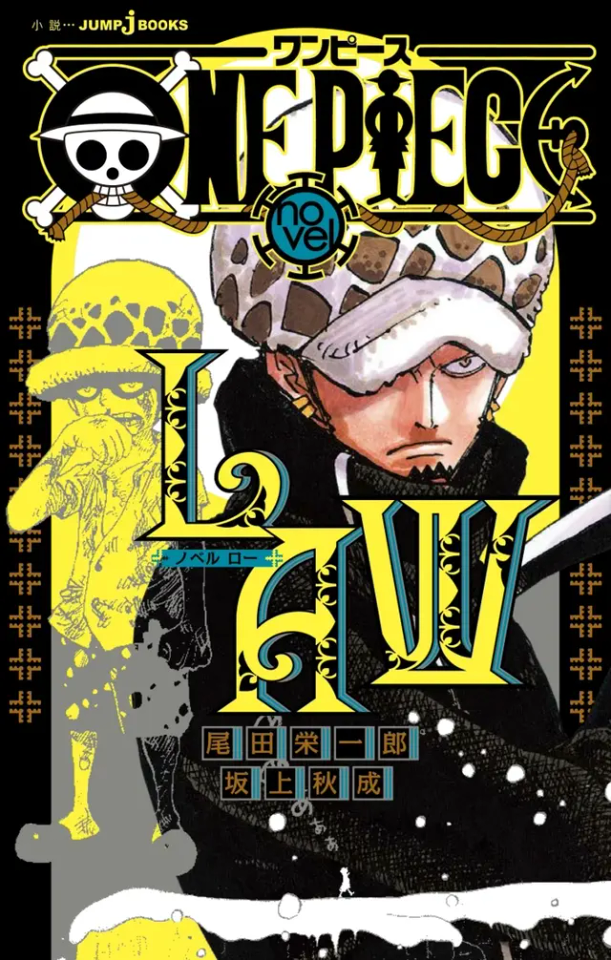
Some notes before I start:
The edition I've read of this novel is the official Spanish translation by Planeta. When quoting and mentioning numbered pages, I'm referencing that edition.
I originally posted this on Twitter as a thread! If it sounds familiar, that might be why.
For those who haven't read the novel and might want to: be mindful of some trigger warnings, including gruesome medical descriptions, suicidal thoughts, mentions of abuse, and violence in general (I won't be touching on these subjects here though).
These are just my personal impressions, I'm not trying to tell anyone how they should interpret the novel or Law's character. I'm just doing this for fun!
The story takes place right after Cora dies, following young Law's journey as he makes it to Swallow Island and desperately tries to survive. There, he will meet Bepo, Penguin and Shachi, as well as Wolf, a novel-exclusive character that welcomes Law and the boys into his home as a family.
Overall, it's a very short read, agile and straightforward. The style is very juvenile, but that was to be expected, and I'd say it does a pretty good job at capturing the feeling of watching a One Piece episode. The novel does kinda feel like a mini arc.
I'm unsure if light novels can be considered 100% canon in general, but since the contents don't contradict anything from what we've already seen in the manga/anime, I'm going to assume we can at least take the events described in this one as canon.
But I'll leave the plot aside a little bit to focus more on Law's psyche, analyzing everything in the novel as material that helps us further understand him.
The entire book (save from a few specific passages) is written from Law's point of view and in first person, so it offers a more in-depth look at his way of thinking, motivations and ideals.
What I find most interesting in this sense is that the whole story is very centered around Law's kindness. Though he does admit several times that he had wanted to see the world burn when he was under Doflamingo's care (as we already know from the source material), the novel makes it very obvious that Law's true nature is compassionate. His inner voice even explicitly states that he enjoys helping and making others happy. (Quotes roughly translated from Spanish):
P. 27: "And I felt very comfortable collaborating with the task of helping others."
P. 92: "Knowing that I was going to free a person from their pain [...] gave me a joy I had never experienced before."
P. 136: "Just imagining the surprised faces of the Old Man, Bepo and the others brought a smile to my face" [when planning on getting fresh fish for dinner as a surprise].
And, despite living under Wolf's motto of "give to take," Law never expects anything in return for any of his good actions. In fact, he gets furious at Wolf himself when, after saving his life, the old man insists on giving Law anything he demands as compensation.
P. 120: "I didn't save you because I wanted a reward!" [...] They [Bepo, Shachi and Penguin] burst into tears of happiness when they realized that you had survived. That's more than enough for me! [...]" I won't let you belittle their tears!"
But even then, Law keeps arguing that he only saved Wolf "on a whim," much like he would say years later when asked why he chose to save Luffy's life. This is a common theme throughout the whole book (which is also pretty obvious in the manga)—Law doesn't recognize his own kindness.
It's not modesty or shyness, his inner monologue makes it very clear that he doesn't see himself as good-natured, and is often confused at his own motivations.
In their first meeting, when Bepo asks him why he is so nice to him, Law doesn't know what to answer; and after that, when Law finds himself wondering why he's trying so hard to save Shachi and Penguin despite their past history, he blames it all on "doctor's pride."
P. 48: "I wasn't even a good person."
Still, regardless of what Law might think of himself, living in Swallow Island seems to be making him progressively gentler. He was wary and hostile towards Wolf at first, but eventually lets himself trust people again, trying to honor Cora's memory and what he taught Law.
In Swallow Island he builds his new found family little by little, though never letting go of Cora and what he meant to Law.
P. 39: "Cora and I were family, that's what I felt at heart, I had no doubts. We had loved each other without saying it out loud [...] Would I feel the same for the Old Man and Bepo eventually?"
Slowly, he starts finding comfort and joy in community. He lets himself be carefree around his new friends, treating them with open affection, laughing and being surprisingly enthusiastic (although he quickly starts taking his role as a leader very seriously, and sometimes avoids showing weakness around them so as not to worry them.)
Law even gets to become an active part of life in Pleasure Town, where he and the other boys are cherished after 3 years living and working there. He's comfortable with his role in the community and appreciates the people in town. His sense of duty towards them shines especially when the pirates arrive to attack the town.
Again, this contrasts with how Law sees himself even in the manga/anime, where he insists that he acts mostly out of selfishness and only seeking his own benefit (or, in the best of cases "on a whim.")
But the truth is that Law's decisions are almost always related to other people's desires.
In this sense, the concept of guilt is also key to understand Law's motivations and his relationship with the world as a whole. This is especially obvious when it comes to Cora—Law even briefly wishes that they had never met, so that Cora would still be alive (p. 128-129.)
In a way, guilt is what moves Law forward, and what slowly starts transforming into a thirst for revenge, into rage and hatred towards Doflamingo and possibly towards himself too. It's a kind of tragic guilt born out of love.
His love for Cora still haunts him, his last wish for Law is the big enigma that he tries to solve during his 3 years in Swallow Island: be free. What is freedom to Law? How can he fulfill Cora's request? This is the question that gives meaning to the novel.
We know that Law wouldn't feel free until finally taking down Doflamingo and avenging Cora's death many years later, but he hasn't reached that point of determination in the novel yet. Maybe that's what gives the narration that hopeful and optimistic tone, with a young Law that's still finding himself, experiencing wonder in loving again, and learning what it means for him to be true to his values. It's the start of an adventure, and its core theme is love.
The ending illustrates this very well; I especially like the moment where Law names the crew as they're setting sail:
P. 243: "Cora's love that he showed me, Wolf's affection, the trust I had in my companions. One word embodied it all: Heart."
It is love that gives Law a reason to keep going. And I'm so glad that the novel doesn't shy away from this fact and isn't afraid of sounding "sappy" or "corny," because I do believe emotion is a very important part of Law's character.
The epilogue closes with a very interesting quote in the last page:
"You hear that, Cora? This is my... This is our pirate crew."
It is unclear if by "our" he is referring to himself and Cora, as if dedicating this new beginning to him, or if he means him and his crew. I'd personally like to think he means it both ways. But in any case, it's interesting that he openly shares the honor of "owning" his crew with someone else. He is the captain, but not the owner. It's another little way in which his generosity is evidenced.
Overall, it was a very enjoyable read, and it left me wanting more. Obviously, it's not a literature masterpiece, but it gives a lot of interesting material for character analysis, which is super fun.
Finally, here’s a few fun facts for those who can’t/don’t want to read the novel but enjoy the little trivia:
The Polar Tang was built and designed by Wolf.
Law’s first tattoo was "DEATH," and he got it at a local tattoo shop in Pleasure Town at around 15 years old.
Shachi and Penguin are childhood friends and likely met through their parents.
Shachi had always wanted to be a hair stylist.
Law is bad at cooking.
Both Shachi and Penguin are good at cooking, especially Penguin, who worked as a waiter in Pleasure Town.
The Hearts’ jolly roger was collectively designed by Law, Bepo, Shachi and Penguin days before leaving Swallow Island.
Law decided the name of their crew upon setting sail for the first time.
And I think that's all! ♥ I hope my rambling was enjoyable at least!
Edit: I've now posted an analysis of the Ace novels too!
#trafalgar law#trafalgar d water law#one piece#one piece light novel#one piece novel law#one piece meta#irene.ppt
191 notes
·
View notes
Text
Kim's Motivations vs Privileges // A Meta Rant
This has been sitting in my drafts for a while, so I figured I'd post it~
I’ve talked a little bit about Kim’s place in the mafia before, but I don’t think I ever got into detail as to what his motivations are, in regards to being part of a known crime family in Bangkok. So I figured I’d talk about it, since I’ve been mulling it over for the past eight months or so!
So, one of the most common takes I’ve seen in the fandom (from where I’m sitting, anyway) that feels like it's often taken for granted is that Kim is interpreted as actively trying to get away from the mafia. Or if not that, already out of it completely.
More specifically, from his family.
And meh, honestly? Who tf knows what goes on in this guy’s head, lmao! While I admit that it can be argued there is some evidence for this, I’m more personally inclined to think that Kim’s privileges as the youngest son and his personal motivations are—more often than not—misconstrued.
Now, just to be clear, I'm not totally against the idea of Kim being out of the family business/trying to get out of the mafia. On the contrary, it's a neat headcanon to explore, both in the realm of fanfiction and as a way of understanding his character arc when watching the show. What I'm more iffy on though is the fact that there are a number of cultural aspects to this idea that I feel like are—not willfully disregarded, per se, but there is a bit of a western bias to it.
And before I go on, my usual disclaimers
I’m not calling out or policing anyone; this meta is just an opinion at the end of the day, and something that I've been thinking about for a long time, so I thought it would be good to get it down succinctly. Y'all headcanon him in the myriad of ways you want, even if that includes him distancing himself from the mafia ongoings of the Theerapanyakul family. You do you, since that’s what fandom is for! Besides that, I can happily acknowledge that it makes for some delicious fic drama~
Culture is never static, it's an ever-changing set of mindsets and values, and by no means should it ever be seen as the be all end all when it comes to this sort of discussion.
I'm Filipino (more specifically, Filipino-Chinese ancestry), not Thai, the two cultures are very distinct in their own ways. There are cultural overlaps, but otherwise, these are only my opinions as a SE Asian, and in no way meant to be seen as a full authority on the subject, as lived experiences differ greatly even amongst those who grew up within the culture in question, or adjacent to it.
Having said all that, this rant is examining Kim's privileges in the context of Asian family dynamics and cultural traditions, and taking into account as to what those said privileges he enjoys could possibly motivate him to do. I'm also gonna include some novel bits, so if you haven’t read the book, here’s your obligatory spoiler alert warning, as well as my one plea of “please don’t attack me for reading the book and using it as part of my basis in arguing my thesis.”
But I digress!
In regards to my claim, this isn’t necessarily a bad thing; if anything, it goes to show how effective BOC, Daemi, and Jeff were in developing his character, that the Kim we see in the show embodies a key characteristic of his that’s very loyal to the original novel: his thoughts and motives are often hard to read, and even his own family members have trouble trying to understand what he’s really thinking.
I for one can definitely say that Jeff leaned heavily into Kim's character archetype of a cool and mysterious love interest, which we do see a little bit in the book.
As we see below, per Korn:

Like in the show as well as the book, the audience doesn’t really know what Kim is thinking.
(Just as a little side note, even within fandom, I think that's probably part of the reason he gets such a bad rap—yknow, outside the Kimchay community—and on the other side of that, there are sometimes conflicting interpretations (which is a good thing, we're engaging critically with the media!) in regards to what motivated him to make the decisions he did.)
He’s not a main POV character in the show, so his motivations are pretty murky, since it can be argued just as easily that his sleuthing behind the scenes can be seen as a way of strengthening his own position within the family, as it is his own efforts in protecting his brothers.
Perhaps it’s both or more than that—or hell, perhaps none of those things; it’s not as if he’s only allowed one or just those motivations, right?
Having said that, what the audience does know about Kim and can confirm, are the privileges he enjoys as the third son:
he was able to move out early and live on his own
he does not have as many bodyguards, which enables him to go sleuthing behind Korn’s back
he has the freedom to pursue a career in music, since that’s his main interest
In and of itself, the privileges Kim enjoys, if anything—demonstrate a lifestyle in which he is neither trying to run away from the shadows of the Theerapanyakul family’s infamy, nor is he really trying to gain a foothold within the mafia’s hierarchy in order to up one, or all of them. And I believe that's the entire point of his character, because we're not supposed to understand what he's thinking.
The way I see it, Kim enjoys the privileges as mentioned above because of the fact that he’s the third son of the top mafia family in Thailand, not the other way around. And because I see them more as privileges, they don't necessarily mean anything in terms of what motivates his actions.
There’s a few reasons for this:
Pursuing the Arts and Asian Style of Parenting
There’s a bit of a negative stigma in Asian cultures in general when it comes to pursuing the arts. Mind you, this isn’t unique to Asians, but it’s also a much more noticeable sentiment in Asia (i.e. the stereotype of Asian tiger parents wanting their kids to pursue something that contributes to society and makes a solid income, like doctors and lawyers). Asian parents in general tend to be overprotective and controlling of their children’s futures, and there’s still a relatively pervasive idea that one’s education is strictly tied to their lifelong career.
We see this in a multitude of ways in the show: for example, when Kinn first brings up his interest in music to Porsche during their ep. 6 forest adventure, he speculates on his father paying off the judges in the music competition he’d participated in. Even if at the time, Tankhun would presumably have still been the heir and Kinn was freely allowed to participate in the event, Korn exerted a tremendous level of control to ensure that Kinn came out on top, irrespective of how Kinn himself would feel about this.

Another example: Chay himself is willing to give up a college education, let alone study music, due to having seen how much Porsche struggles to financially provide for both of them. In the scene below, he makes it known that he's open to the idea of using the last of his parents' savings for his education in order to move some place else.

For Chay, the prospect of college is in and of itself a privilege they can't afford and at large, speaks very much to the wealth gap and inequality that still exists in Thailand, as it does for other Asian countries. It's not hard to understand why Chay is easily able to give up the opportunity of the oral interview in his dream school, besides just being heartbroken—he's always been more willing to face a reality of lifelong struggle, so long as it means he and his brother are together.
It's only because of Chay's own obedience to Porsche and his respect for him, that he even makes a show of going to the interview, rather than outright admitting to Porsche that he's no longer interested in going to that particular school. His short stint of teenage rebellion in the second half of the show is hidden from Porsche, in order to maintain the illusion that he's following the path Porsche specifically worked hard to set up for him.
Of course it goes without saying, this is no way meant to discredit Kim's work and effort to maintain a career in the entertainment industry, free of his family's influence or financial manipulation in that field. What I will say however, is that Kim's access to wealth, as well as the freedom afforded to him, allowed him to pursue his passion in music with significantly fewer obstacles, in comparison to Chay—enough so that the negative stigma is a bit of a moot point.
And we all have some idea of how Gun views Vegas’ culinary interests. :’D
Traditional Gender Role(s) and Internal Sexism
If we were to compare Kim's situation with any other character that would have been in somewhat similar circumstances regarding "leaving the family business," the only one that comes close to fitting the bill is Nampheung. Arguably we could also count Macau in terms of the lack of family involvement, but presumably since Macau still relies on his father and brother financially to support him, I'm leaving him out.
In the flashback scene with Nampheung, we see indicators of a contented life she's already begun to lead, away from the Theerapanyakul household: she's married with two kids, her husband runs a successful business, she manages to find time to pursue her passion in art, etc.
For all intents and purposes, she lives independently, and seemingly without having to rely on her adoptive brothers and father.
And yet, we know how Nampheung's story plays out, regardless of which brother pulled the trigger.


Mind you, although Korn and Gun's reason(s) for wanting Nampheung to return to the Theerapanyakul household has less to do with her sex and more to do with what she and her husband knows (whatever the heck that means, lol), it doesn't mean that a double standard, when compared to Kim's own living situation, isn't baked into it.
(And again, before I continue: this is in no way discrediting Thailand's efforts in furthering gender equality at large. The Thai government has made significant strides in improving women's rights, particularly in the work force. Despite this however, challenges still remain to this day, as do for most countries, when it comes to this particular issue.)
Why is it that Nampheung—a woman who was able to make a life for herself completely free of the Theerapanyakuls' influence—was still forced to return with Korn and the danger of being involved with the Theerapanyakuls, and yet Kim—who we can argue still benefits greatly from his family's (ill-gotten) wealth—is somehow able to more fully enjoy the freedom Nampheung could have only dreamed of and experienced for a short time?
In the same episode when Porsche reunites with his mother under the worst of circumstances, Gun makes a plea towards Nampheung to return to him, that he would be the one to protect her. The scene paints Nampheung as a damsel very much in distress, and though Gun claims to love her, he still treats her as a prize to be won, to take his side in their family conflict.

The framing of this theme in the show, of "trying to get away from the family," is gritty at best, heartachingly frustrating at worst.
I think this in particular is part of the reason why I'm less inclined to believe that Kim moved out strictly to not involve himself in the business. Like, for my own peace of mind, I try to temper this point (perhaps to my own detriment), yknow?
Personally, I feel like since Kim is able to live comfortably outside the family compound and pursue his music career, there would have had to be some sort of return or condition for this to be allowed (one of them being, he knows how to fight and protect himself).
After all, as Korn himself said:

Filial Piety and Birth Order
I've talked about this plenty of times before, so I won't get too deep into it (haha), but this perhaps plays the biggest role in what is disregarded in the "western bias" I spoke of earlier.
As a working definition, filial piety means showing care, gratitude, and obedience to your elders, be it one's parents, grandparents, ancestors, etc etc. This virtue is one of the most important cultural aspects in Thai culture, as well as other Asian cultures, and underpins the very bedrock of our communities.
I've written out another rant before that Porsche's initial judgement of Kim moving out of the family home hints very much at not only his own specific veneration of the family unit, but his internal biases in the way he sees how a family should function.
TL;DR: Kim moving out is something that Porsche does not see as a good thing whatsoever, despite his own misgivings about the Theerapanyakul family, when he first starts working for them. Porsche sees Kim's actions as being egotistical and self-serving, and to a certain extent, unfilial towards his family.
And part of this filial piety is the obligation that in their parents' old age, children are expected to take care of them. We see this in a couple of different ways in how Kim behaves towards Korn:
In the first and only scene they have together, Kim brings Korn one of his favorite snacks, to show consideration towards his father while stopping by for a visit, since his main objective (besides snooping around) was to ask Korn why Big was assigned to him.

Although the highlight of the scene shows the very mutual distrust between father and son, Kim still shows how dutiful he is towards Korn. He makes a point to show that he's very aware of his father's preferences in many different things: his food, his requirements when hiring bodyguards, hell—even the way Korn organizes his private space and his use of secret cuckoo clocks to open locked drawers, lolol.
The filial piety he exhibits towards Korn is, to a certain degree, very much a front. Yet its very role as a front in how Kim interacts with his father is telling of how much there exists a familial hierarchy between them, and that Kim still respects and is a product of his upbringing. He's not openly hostile against Korn, or even against whatever Korn has up his sleeve with Porsche's employment; if you think about it, at least up until Kim realizes he's fallen in love with Chay, Kim has the least to worry about with Korn's intentions in hiring Porsche.
Theoretically, anyway.
Another point, for which I've brought up before in another meta: at the end of the day, Kim is unable to actually disobey his father, as shown in this scene when Chan comes down to escort Kim to see Korn.

While there are definitely times in the show that Kim plays at straddling the line between filial piety for show and disobedient, spoiled child, at the end of the day, the deference he feels compelled to show Korn is still a leash around his neck. Even in this scene where Chay has gone missing along with Porsche, Kim cannot yet, if ever, cross that almost insurmountable boundary of actually going against Korn's word.
Especially given the context of this scene, at the eve of the Minor Family's coup.
In fact, I could even go so far as to say that perhaps another one of Korn's conditions for allowing Kim to live away from the compound, is Kim's obedience.
To be honest, Kim's place in the familial hierarchy of the Main Family is very much a double-edged sword, in that his position as the third son is simultaneously the place of least expectations from Korn, and thus, the one with the most freedom, yet also the last bastion of Korn's hopes and expectations for their family, should Kinn become unable to perform his job as the current heir.
The way I see it, though Kim doesn't have the pressure of running the mafia empire, he still carries the weight of authority that his name represents, and Korn (as well as the very environment and culture that he grew up in) holds Kim to that, as his father, as the one in position of authority in their family.
In retrospect, I think that's part of the reason BOC chose to elevate Kimchay's love story as much as possible, despite their story being almost entirely absent in the first novel the show is based off of.
Kim needed to be humbled by falling in love with Chay, because he too carries the weight of power like Vegas and Kinn. And like the other two men, he needed to understand what it meant to have a weakness.
(As a side note too, in terms of tropes in fiction, Kim's position in the hierarchy actually fits a number of them: Youngest Child Wins, Rule of Three, and Underdogs Never Lose.)
Conclusion
Kim, for me personally, is such an intriguing character because he represents both what Tankhun has long forgotten (and perhaps never even had in the first place—ambitions of his own, a passion to pursue outside of his family), as well as what Kinn had lost, when he took up the mantle.
Personally, I think the fact that he has these privileges—being able to live outside the compound, not having to involve himself in the tedious running of their family businesses, etc—gives him more reason to stay within the fold of the Theerapanyakul family (despite his emotional distance), not less, even if we don't take Chay into consideration.
We may not know what Kim is thinking, but beneath his aloof exterior, I'd like to think that, at least when it comes to his brothers and his father, he's not entirely self-serving (Chay is a different story, lmao).
Because again, at the end of the day, although Kim enjoys a lot more freedom compared to his two older brothers, there are still a lot of familial ties and obligations—forged and solidified by his upbringing and the culture he lives in—that even his genuine love for music and his burgeoning idol career can't fully replace or throw away.
#kimchay#kinnporsche the series#kpts meta#character analysis#kim theerapanyakul#meta#character meta#why don't you stay#ahahaha
26 notes
·
View notes
Text


it has become so difficult for me to understand why people think utena's feelings for akio are romantic when she literally says things like this (however indirectly) about him. it's surprising to me how so many people's interpretation of her arc is that it's something as simple as "oh she got a crush on the worst guy possible" when there's so much more to look into both for utena personally as a character and for the show's themes in general. i mean this entirely separately from the comphet discussion too. to me, utena's relationship with akio is all about the idealization and longing for family, and i believe that's all she ever wanted from him. romance is obviously present, but it's entirely his doing, because he loves twisting these ideas into their worst possible form and intertwining them until they're indistinguishable from one another.
i struggle to see the seemingly more common interpretation of utena having a crush (genuine or otherwise) that he takes advantage of, though i suppose i must have believed it initially. it feels like the more surface level reading of events, but once you start looking just a little deeper than that, you realize a lot of interesting things about utena's character that i think you entirely miss otherwise. her parallels with anthy certainly become clearer, which is one of the most interesting parts of the show.
#i do think there are multiple valid ways to interpret it i just find this one infinitely more interesting and thematically coherent#revolutionary girl utena#analysis#utena#akio and utena#m
156 notes
·
View notes
Note
3 and 7 for wendy if ur still doing the character ask thing!!
finally I get to talk about one of the girls
3. Least favorite canon thing about this character?
the misogyny in gf's writing always makes me extremely sad. this goes for most if not all of the female characters in the show but I think wendy suffers from it most heavily as the object of dipper's affection. she's cool, sure, but she isn't really allowed her own ambitions or weird stand-out traits the same way other characters are. wouldn't it have been way more interesting for dipper (and by extension the audience) to start seeing her more as her own person once his crush on her becomes old news? ...of course, that leads me into my other point, which is that it was incredibly lazy to continue the plot thread of ~dipper's crush on wendy~ after that arc had been neatly closed off. roadside attraction was a mistake and I would have gladly traded it for that scrapped episode about stan and wendy pulling off a heist.
I suppose the real problem here is that almost everything we know about wendy seems to be through dipper's interest in her, so there isn't a lot of room for her to be anything except Badass(tm). let her be weird! there's literally nothing weirder than being a teenage girl!!
7. What's something the fandom does when it comes to this character that you like?
It's so much more difficult to find things I like about fandom portrayals than things I dislike, but I am a fan of the almost universal understanding that wendy is a lesbian. I'm also glad trans headcanons are fairly popular for her, I think it makes her confiding in dipper about being taller than all her brothers very fun (and the common theme in gf of characters bonding over being considered 'freaks' always resonated with me in a trans interpretation way).

#lab notes#lab creations#askbox#sorry it's late I wanted to draw something since I didn't have any good wendy pictures#gravity falls#lab discussion#gfposting
342 notes
·
View notes
Note
Only if you wanna but could you talk about like the narrative themes and what you like about one piece and what areas the show excels in? I know very little about it besides pirates and zoro but would love to hear what you love about it
i mean god forbid you end up like me
anyway i'm not the most qualified person on it but here's what i can say briefly
but:
the art style is goofy yes but i'll tell you that you actually watch the animation progress positively and it becomes very endearing and the character designs are truly some of the most creative that you'll ever see in this particular brand of anime and you'll find that even the most ridiculous characters often have an important backstory which lends to the fact that you really shouldn't be basing anything or anyone on appearances which is a theme that heavily threads throughout one piece
every major arc has major themes attached to it that i would say are actually very in depth once you get up to i would say past syrup village arc which is the 3rd arc, by then i would say it starts deviating from the common shonen anime with themes that are a lot darker (i say constantly that one piece would not be as watchable if the art wasn't so goofy making it easy to undarken the plot). i'm literally looking at the arc list and using recall to show the major themes and i'm trying to not spoil by linking arc to theme but things such as child trafficking, extortion, royal family conspiracy, resource hoarding and utilization, the role of doctors in a society, medical prejudice, pandemic management, family and generational trauma, gluttony and excess, childhood trauma (a LOT of this), false idols and false religions, secret police, LGBTQ identity, racism, sexism, prejudice, colonization vs assimilation, propaganda (a LOT of this), misappropriation of justice, government coups, challenging international structures, slavery, child experimentation, isolationalism, misuse of technological advancement etc.
this manga does the BEST interpretation of character development by age that i've seen in most shonen because the kids behave like kids, the traumatized kids behave like traumatized kids and grow into appropriately traumatized adults, the adults act like adults, characters remain consistent in their principles for the most part even when their actions appear inconsistent like i will say oda understands children, teens, middle age, and old people well and shows how they interact very well and the adult child relationships are very realistic with a good balance of good ones and bad ones. in fact in general, platonic relationships are done very very well which i think a lot of mangakas struggle with cuz sometimes you'll literally get to the end of a manga and have the sense that this writer does not have many friends
it has a good mix of light and dark arcs in general, i will say there are VERY wide emotional swings and some of them can be poorly tolerated (some arcs are not as good but no one really agrees on what arcs are bad and what arcs are good cuz there is something for everyone, yes i hear about skypeia but people are definitely exaggerating how bad it is. that being said fuck long ring long land arc that was too nonsense even for me lmfao). i don't cry often watching shows and i definitely cried at parts i didn't expect to and didn't cry at parts that i was told would end me so your mileage may very
there are so many interesting characters like ofc i have a luffy bias but luffy is likeable to a broad range of people and is very different from the current gen of protags in that he's not meant to be relatable which a lot of people have said probably in better terms than me, but kind of like appreciated and watched, and how he interacts with his family, friends and crew are really remarkable. unlike other protags he's also not easily overshadowed by the supporting cast even though they are all very strongly characterized and interesting in their own right. all of the straw hats are very likable in their own way, and many of the other crews are well developed and stand alone which is a testament to how good the writing is because with a cast this big it is very easy to turn other characters into shells.
SO MANY GRAY CHARACTERS. SOOOOOO MANY. you can literally chew on everyone for hours and can't really 100% say that they're completely good or bad. the good aligned characters do bad things. the bad aligned characters do good things. enemies turn into allies. allies turn into enemies. like you really cannot tell what will happen for a while with each person which again harkens back to the whole idea that appearances are truly meaningless in one piece you have to judge someone's heart.
there is no preaching. some animes preach what's right and what's wrong and others don't have any consistent values to the point that it's jarring. one piece doesn't do that although depending on how you feel personally in terms of morals you will decide what you think is right.
it's honestly just fun and creative. i will warn you that some arcs will drag but if you push through it there's almost always a reward and a relatively clean wrap up at the end
this is a small thing. but i'm biased to brightly colored shows now because i am tired of edgy color palettes and horror just for the sake of it. i'm old.
anyway i'm rambling but these are my biggest reasons but ofc like you are free to spend you time elsewhere but i'll genuinely say if you're just like not watching it cuz of length there's no point in you watching 10 mid animes that are shorter when one piece is one there. even if you also may consider liking the rubber man. god forbid.
13 notes
·
View notes
Text
nuts reading trigun in japanese 7 - filial piety, and meryl
my alternate readings/translation/interpretation of jp lines are for triangulation purposes and nothing else.
ch 10-12. a more general scattershot of a post than over analyzing the japanese texts this time round. i think meryl in these 3 chapters is the most interesting character for me. but mainly bc she seems to be carrying a baggage: her struggle with filial piety.

^OH's version

ソレが普通ですわよ That'd be the most common sense thing to do. それにもともと家訓からして『自立せよ』ですからね But our house's motto is to first be independent above all. ドライといえばドライなのかも Mine would just be dry beyond dry...
me: hm. an office lady in the context of being written in 1990s by a japanese guy. i understand.
(i actually prefer OH's version bc the implications of what shes saying is the exact same, but more importantly leads into this page)
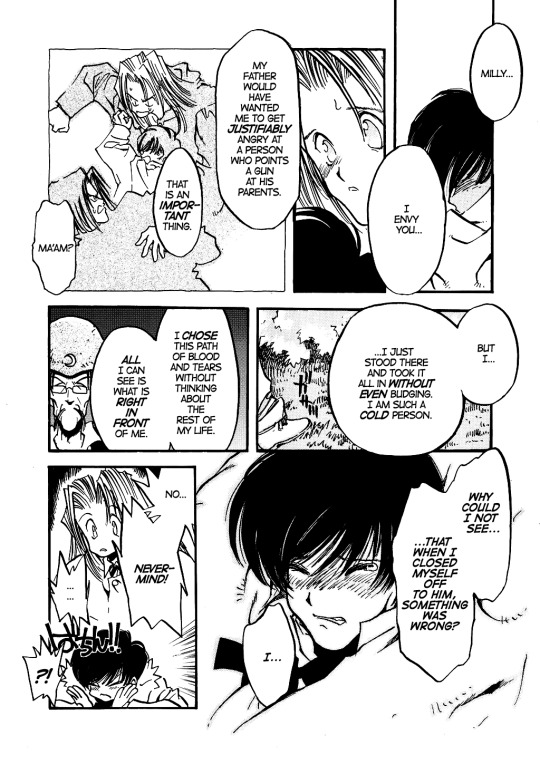

いきついて見れば When I realized all that 何か大切なものを忘れてるのかも… Realized that perhaps I've forgotten something (filial piety) so important... 私… I...
(you can see how this raw translation fucking sucks. I'd reword it in a way that's along the lines of 'feeling so ashamed as to forget getting angry', but OH's version is a downright banger. 11/10 the implications of what she feels is still the exact same. love it a lot!)
right so.
filial piety.
filial piety for a lot of asians is... kind of hard to break down. but perhaps can be explained as "abandoning ones' parents is the worst sin one can do".
not being filial is an invitation to the most extreme judgement from relatives and outsiders in a society which upholds it as the absolute virtue. at least, for the most part. (late stage capitalism fucked it all up yayy)
abandonment can be in the form of presence and/or financial. if a child doesnt make bank to pay back for their parents raising them up, they're not filial. if a child is absent and not there to take care of their parent, thats not filial.
and not being grateful, not being filial, equals shame and warrants divine punishment. (check out folklores like momotaro and kaguyahime that touches on these themes)
meryl i think struggles with that bc shes likely an only child who is expected to work an office job after studying super hard for it, and is now living independently away from her parents. meaning, she is technically not present to take care of them, which in this context makes her feel immensely guilty.
to make matters worse, it sounds like shes one of those types where her parents possibly had to work a lot to pay for this and that, resulting in a severe lack of communication. so this compounds, and she can only write dry stuff in her mind.
milly, by the way, does not have this problem as much:

she has a lot of siblings who can shoulder the weight of it all together, so in terms of that filial piety stress shes not doing so bad.
Badwick, the focus of this arc, by the way, faces the same struggles with meryl:

i mentioned the financial part bc from how chill the parents are with him, i think its possible he was trying to sell the land for large sums of money for his parents to retire. theres an added level of resentment going on that complicates their dynamic, with a dead brother and a land that means too much to sell for any sum of money.
and also his parents are... too nice and understanding, jeez.
i dont think meryl has the resentment. i think her case was similar in that her parents worked hard to provide and kinda neglected her in the connection part.
ofc this might then bring up the question of, 'isnt filial piety kinda transactional?', and, yeah. it... frankly can be. some parents have weaponized it, knowing that a society which forces unconditional love and financial support from a child is a good retirement plan. and it sucks. nightow must have realized this and sidestepped it.
whether bc it will not be well received by the then jp audience or if he just doesnt want to tell a story about this, i dont know. there could also be the fact that the 90s was a bad time to be talking about securing retirement for parents when the economy was circling the drain.
trigun gets dark later. we are getting love and peace above all else, at least for now.

...hm something seems to be rising over the horizon. but we can deal with that later. domestic violence
also i think vash is the kind who would also be a filial son to rem. this aspect of him is just lurking silently in the background in hindsight. in a barrel.
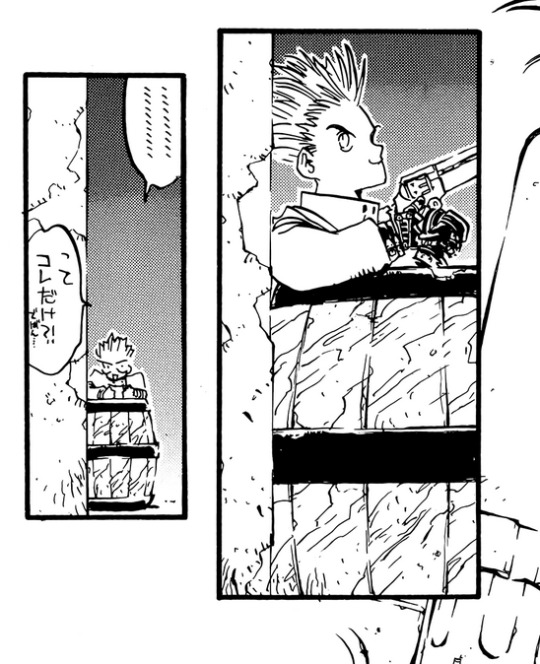
(incidentally i think this is also why luida and brad got promoted to surrogate parents position in stampede. much to ponder ponder...)
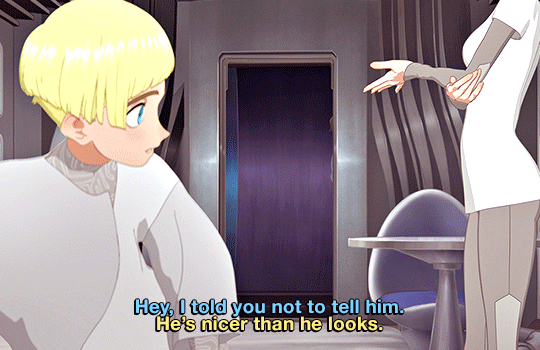
31 notes
·
View notes
Text
Class 1-A band
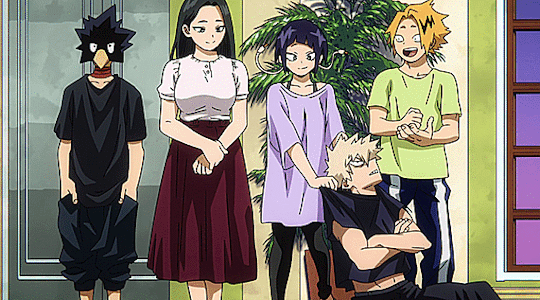
One last band reunion... before they're all shipped of to war.
I have wondered about this group’s dynamic:
Kaminari, Jirou, and Yaoyorozu first established a bond through surviving USJ together.
After that, Yaoyorozu and Jirou are often seen together, and the two of them might be each others closest friend in 1-A.
But Kaminari is probably the only one, who's friends with all of the band members:
I don't think I need to elaborate much on Kaminari and his electric bond with Jirou. Semi-canon shipping aside though, they're definitely friends.
Same with Bakugou. To him, Kaminari's probably the second real friend that he made in his life. (Or rather, Kaminari made himself Bakugou's second real friend.)
Tokoyami and Kaminari apparently got closer to each other through the band. Tokoyami's thoughts during Kaminari's big (that should've could've been more elaborated on) badass scene during the Gunga Mountain raid, outright stated, that he views the latter as a very good friend.
In one of my previous posts, I headcanon that Kaminari is one of Class Mom's favourite children. Canonically, Kaminari and Yaoyorozu are actually depicted as laughing with each other in the background more than a few times. I find KamiMomo to be an underrated background friendship, as I can see them being good for each other: Both are sensitive souls and often try to encourage others.

Kaminari also was the one, who immediately interupted Yaoyorozu, when she attempted to give 1-A and 1-B the "you are not obligated to fight against a lethal opponent with me" - speech. He instead assured Yaoyorozu that she would not face off against Gigantomachia alone.
But the rest of them? Aren't really close to each other.
...
Let's move from the most easy-going to the most difficult 1-A band member. In contrast to Kaminari, I feel like Jirou, Yaoyorozu, and Tokoyami would have a more “normal” reaction to the snappy Pomeranian.
As in, backing away and leaving it tf alone.
Because most people can't/ don't want to put up with unwarranted anger and disrespect repeatedly – understandable, especially if there's little to no positive feedback ever.
After the cultural festival arc, Bakugou and Jirou were put into the same team during the joint training arc. In which they were not shown to interact in any manner, that could be interpreted as significant to the relationship between them. No, I don’t count Bakugou saving Jirou by stepping on her, as a sign for a budding friendship.
I headcanon that Bakugou feels slightly uneasy around Yaoyorozu, ever since her assessment of him at the start of the school year. I don’t think that he held a grudge against her for that. But Bakugou is a very proud individual, even after his extensive character development. Having someone - especially someone who’s not a senior but a peer - rip apart that superior self-image he had of himself with such laser-sharp accuracy and soberness, seemed to have been… kinda traumatic to Bakugou and his gargantuan ego. I feel like he would subconsciously avoid being alone with Yaoyorozu. As in, if they happen to find themselves alone with each other in the common areas of their dorms, he will try to leave quickly.
Beyond each other's battle prowess, I don’t see Bakugou and Tokoyami having much respect for each other. Or to put it more mildly: Neither of them has patience for the other's antics.
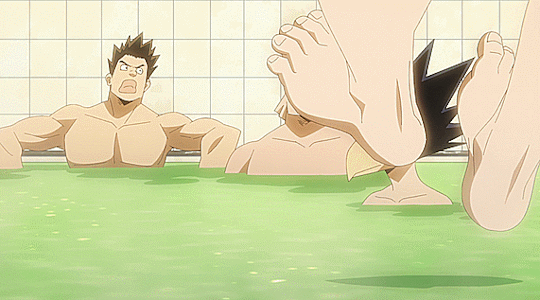
Tokoyami is not amused. Funnily enough, in the gag comics, Dark Shadow - in the form of a little girl - made a ranking list of who/what she likes the most: Apparently, Bakugou ranks third, just behind Tokoyami himself, and Todoroki.
In short: Kaminari gels with everyone. Bakugou gels with no one... except those, who just blend out the majority of his verbal abuse.
No surprises here.
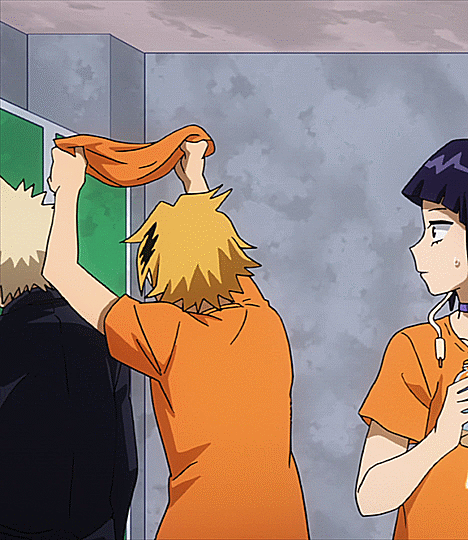
What about TokoJirou?
These two don't interact a whole lot, but the drama CDs gave us Tokoyami accompanying Jirou to a haunted house alone (Kaminari chickened out). It includes Jirou asking to hold onto the hem of Tokoyami's uniform and him reassuring her fears. (It's all very cute, go look it up on yt!)
Main media-wise, Tokoyami and Jirou had a moment of joint badassery during the final war. From that sole interaction, I’d say his dramatics and her snark go well with each other - be it directed towards each other, or united against the big bad.
Aside from that, we haven’t gotten much of Tokoyami and Jirou together, unfortunately. However, I believe they get along well. Based on the drama CD, it could even be inferred that they are friends, and most of their friendship just never made it on-screen.
What about TokoMomo?
We know that Yaoyorozu's self-confidence took a critical hit, after she lost against Tokoyami in the sports fest at lightening speed. She seemed to have been very shocked about how the match play out. We could assume, that she had been relatively self-confident previously. But we actually don't know, if it used to be more stable. And while Yaoyorozu's match with Todoroki against Aizawa gave her back some self-confidence; from then on, we're privy to more of her thoughts - most of them centered around self-doubt.
So either she'd never encountered a roadblock before losing against Tokoyami, and their match was to her, what her own assessment of Bakugou was to the latter. Or, Yaoyorozu has always been prone to second-guess herself a lot after encountering setbacks.
While he probably didn't pay half as much mind to his quick victory against Yaoyorozu as she did, we know that Tokoyami can be quite observant. I would have find his thoughts about their match, as well as the resulting consequences for Yaoyorozu's self-confidence, interesting.
How would these two interact, if they were to be alone with each other? How could they become closer friends?
During the festival, Tokoyami called Yaoyorozu "Yaomomo", using the affectionate nickname given to her by their classmates. Albeit not close, this might suggest a warm relationship between them.
Tangent: In contrast, Tokoyami still uses "Asui" instead of "Tsu-chan", despite Asui calling him "Tokoyami-chan". On the other hand, "Yaomomo" doesn't sound as intimate as "Tsu-chan". Thus Tokoyami might feel more comfortable using one nickname, but not the other. - Tangent end.
#bnha#mha#mha thoughtbunnies#mha friendships#class 1a#class 1a band#kaminari denki#bakugou katsuki#jirou kyouka#yaoyorozu momo#tokoyami fumikage#bakukami#kamijirou#kamimomo#tokokami#tokojirou#tokomomo#class 1a headcanon#bakugou katsuki headcanon#jirou kyouka headcanon#yaoyorozu momo headcanon#tokoyami fumikage headcanon
140 notes
·
View notes
Text
Richter Belmont Character Profile and Analysis: The deconstruction, and subsequent reconstruction of what makes a hero.
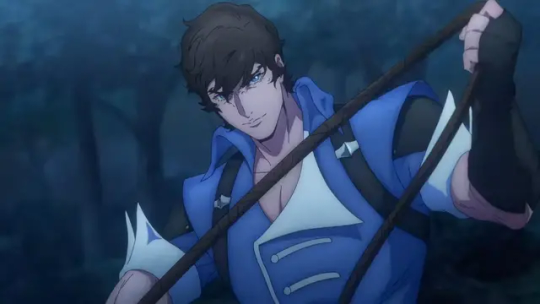
A common character critique that many video game and show fans have of Richter Belmont in Castlevania Nocturne is that he is a weak character; not worthy of being a Belmont on the basis that he's physically weak, not as physically strong nor capable as Trevor. All he does is cry and run away, not being able to carry a fraction of what it means to be a man, merely a shadow of what a Belmont should be.
And sure, all of that is true. But there's more layers to Richter. So join me while I go on a deep dive on what he's accomplished so far... and where I want him to go to fully realize his character arc.
Richter Belmont: From Beginnings to End of S1 Nocturne

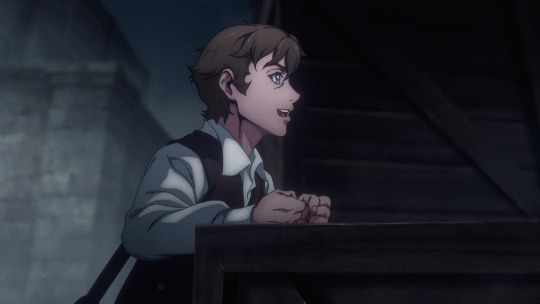
We meet the first young Richter accompanying his mother Julia. He remarks, "I thought I was supposed to fight evil, I thought that was the whole point [of being a Belmont]." This statement summarizes a simplified view of what to him, what it means be a Belmont. When they both encounter Olrox, Richter confidently states, "You've made a big mistake. My mum's going to slice you in two." Even in the beginning of the fight, he is gleefully cheering her on, undoubtedly expecting that his mother will easily slay Olrox just like any other vampire he's probably seen his mother do multiple times.
But alas, as we all know, Richter's precocious worldview as he knew it is pulled under the rug that day.
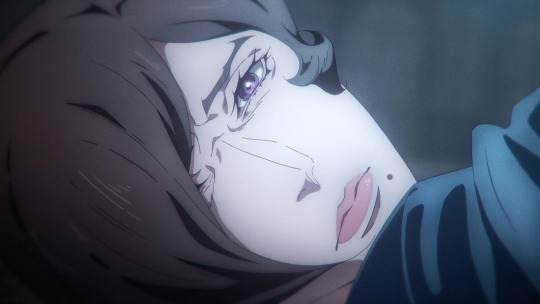
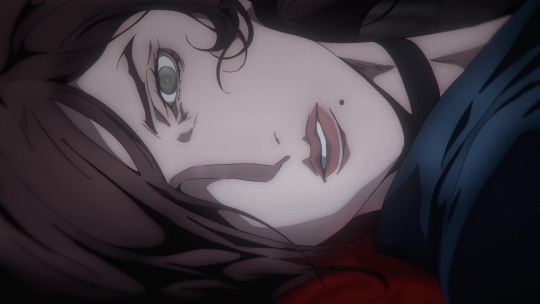
As @ifishouldvanish so incisively calls to attention in their post, Julia Belmont's last words to Richter are not, "I love you" but "I'm sorry, Richter." What is Julia exactly saying sorry for? Not being able to protect Richter? Not being able to protect her family? Not being able to live up to the ideals/image that Richter had in his mind as Belmonts being infallible in their ability to slay vampires? That the last image that he will have of her, someone who he had always seen as undefeatable, brutally slain right before his eyes? This is the last image that Richter has of Julia, and my subject interpretation is this lasting image unconsciously permeates his character motivations, inhibitions, and fears -- fear of (1) being unable to protect his loved ones, or (2) living up to the legacy of what it means to a Belmont, or even perhaps, (3) what is the inevitable outcome of what will become of any Belmont.

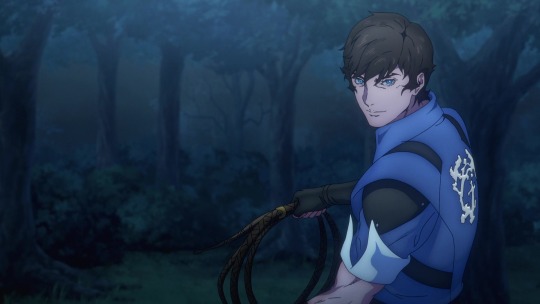
When we are reintroduced to Richter now as a young man, we witness an exemplary display of his fighting capabilities. A slight smirk on his face, his suave and showy fighting style with his whip and throwing knives, as he bodies two vampires while barely breaking a sweat. It comes easily to him, he isn't physically challenged in this encounter at all. The accompanying score is heroic, swelling in triumph.
On first appearances, it's like yes, yes! This is what us fanboys signed up for and are here to see -- this is what it means to be a Belmont -- this badass action hero, stacking an endless body count of vampires and monsters! No wonder fans were so utterly disappointed that Richter ran off like a crybaby when he was needed the most -- and I can certainly understand this disappointment, some fans want to keep it simple -- they just want to see a Belmont kicking night creature or vampire ass in an incredibly display of action sequences.
But is that all there is to being a Belmont?
As we get to observe Richter outside of combat, we start to peer through behind the bravado. He is a bit of a smartass, with a penchant for sarcasm. He deliberately makes it a point that he doesn't believe in anything -- not in any deeper purpose, ideal, or cause. And that he’s perfectly content with how things are. All he needs to do is protect Maria and Tera. Any opportunity or question presented to him that starts to encroach on his deeper purpose (why he fights), or his past (why he can’t do magic anymore) -- is deflected with flippant remark, or a statement that he’s perfectly content with how he is.
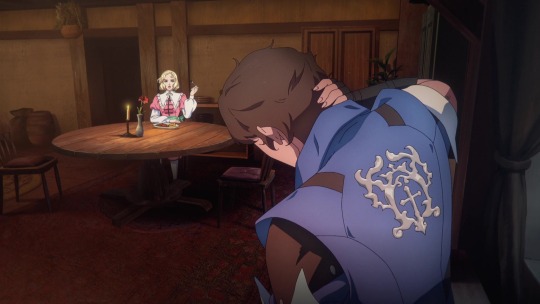
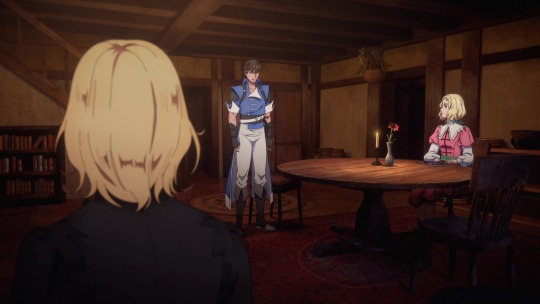


Richter: "I don't believe in destiny." Maria: "You don't believe in anything." Richter: "I believe in you and your mother. I believe you're the kindest and most courageous people in the world. So I don't need to understand the things you believe in, and I certainly don't need to believe in them too. I just need to stand by you. Always.”
Maria: Why do you kill vampires then, if you're so uninterested Richter: Because it's the most fun you can have with your clothes on.
Annette: We're all descended from Gods. We just have to learn to draw from their power. Richter: I'm quite happy with my whip and knives, thank you.


Even when Annette and Edouard ask around for Belmont, he shifts his gaze uncomfortably and doesn't directly acknowledge being the Belmont they’re looking for. Perhaps he's ashamed of carrying the Belmont surname now. Perhaps some part of him wants to forget that he is a Belmont, from a long proud ancestry of vampire hunters who have accomplished legendary feats and here he is -- the only thing he’s actually done up to this point is run away like a scared little boy. By having run away from the gravesite of where his mother died, this encounter is a thorn of what he had left behind, having strayed from the path he really was passionate about undertaking when he was a starry-eyed kid.
When you think of an archetype of a hero, is it about the count of feats they accomplish? Sure, these regaling tales are impressive, but I would argue but the true heart of what resonates with audiences -- the ones that endure in our hearts are the ideals, principles, and values that the hero stands behind -- whether it's standing up for others, standing behind a purpose that they are championing for. The Belmont formula of heroes have been relatively straightforward in their objective -- defeat Dracula, or whatever iteration evil takes (note: @aquilaofarkham has a great analysis of Richter's video game counterpart in their wonderfully written essay with how post-Dracula, the Belmont purpose/expectation is subverted).
Herein lies the problem. Because Richter has resigned himself to live a life where he doesn't want to attach himself to any abstract ideal, purpose, or value, telling himself and others that he's perfectly content with how his life is; he doesn't have any real principle to stand behind, he doesn't have anything to fight for -- living a life devoid of meaning. He doesn’t believe in anything, he doesn’t fight for anything beyond the bare minimum; because if he believes in something (or someone), that would mean you care. And if you care about something, something that is important to you, that means you will inevitably lose it, just like how he lost his mother. Just like how he lost this image or ideal of what it means to a Belmont.
We have effectively a shell of a heroic protagonist in form, but not in any meaningful way. Not so dissimilar when Richter runs into Juste, who is also a shell of what he used to be.
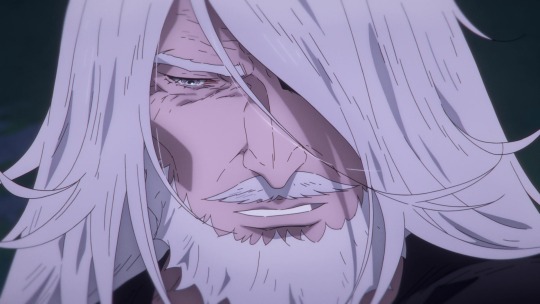
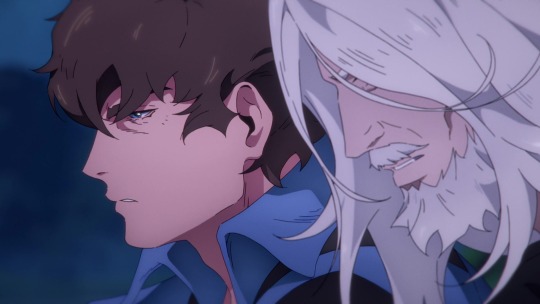
Juste: Evil will always win, Richter. Whatever it is, evil. And it's everywhere. It will always be stronger than us. And you can kill this or that devil. A Lord Ruthven, a Dracula, maybe even an Olrox. But there'll always be more, more and worse. And they'll murder the people you love. No one around you are safe. Evil will always win.
The inevitable outcome, this cycle that many Belmonts have experienced before -- sure, you get to defeat the next great evil (or Dracula for the umpteenth time). So what’s the point of all of this? Why even try?


Richter: Because I had to. I have to live. There are people I love. Pity that it didn't work out like that for you. I'm am much younger than you, that's probably what it is. Juste: Yes, that's probably all that it is.
Richter's last words to Juste are intriguing -- neither a definitive conclusion nor does it provide any narrative satisfaction. Juste's statement still stands: there's always going to be another bad guy around the next corner. But for the present moment, Richter has gained his confidence, his newfound purpose back.
Later, when Richter recaps to Annette his realization that coincided with his magic re-awakening:
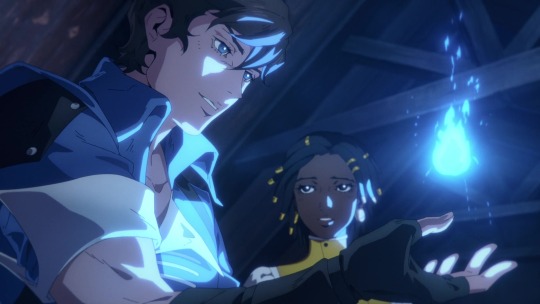
Richter: When I had nothing to hold onto and everything was gone, I remembered the things that make me who I am. The hopes, the pain, and the shit. The love in this house. And I supposed for the first time, I really made a choice about the kind of person I want to be. A Belmont.
Richter is ready to reclaim the Belmont surname, and finally stand behind who he truly is, stepping up to become the hero. He's found his purpose, so he states -- to protect the people he loves.
This quality of Richter is what I find most admirable, and ultimately his most heroic trait. That when it comes time for him to step up to the plate to protect the people he’s decided to accept into his inner world, he will 110% put himself wholeheartedly selflessly on the line. He may be afraid, but he will show up when it ultimately matters protecting his loved ones.
Now this is where my opinion starts to differ -- while Richter’s power-up is one of the most triumphant moments in the show and appears conclusive in how he states that he’s not going to let himself be afraid ever again; in my opinion, it is ultimately is a hollow one because in my opinion, he’s still dodging what is making him uncomfortable. Note how Annette touches on the fact that it’s not a bad thing to be afraid, that perhaps the better approach is to look inward what you have on the line at stake.
It may be cliche but the old adage has never resonated truer in this context: courage is not the absence of fear, but rather the assessment that something else is more important than fear. That in spite of the fear, you make the choice to take action, rather than relinquish yourself to the destiny dealt upon you -- even if the outcome is fixed.
This Distance Between Us - Musings on Richter/Annette
[Note: this section below is specific to the Richter/Annette fanfic I wrote. This starts to deviate from canon into describing concepts I wish were properly realized/actualized, so you can just skip this section and jump straight to the acknowledgments at the end]
----
This Distance Between Us blossomed unexpectedly from what started out as character study/exercise for Richter. As I was writing from Annette’s perspective, I was struggling with Richter -- what drives him as a character, and why might he be drawn to Annette?



The concept behind the title is based on instances where Richter is very observant of Annette's various emotional states and appears deeply affected by them. There also seems to be hesitation on his end, as if he's struggling to find the right words to comfort her. His penchant for sarcasm, jokes, smooth comebacks are gone, replaced with a Richter who is hesitant, seemingly lacking adequate words to comfort her -- or even worse, when he wordlessly watches her tears fall, utterly frozen in place.
Like the core conflict Richter grapples with, it's not so much the lack of physical ability which limits him, but a psychological one. Because the truth is, how they've both lived their lives up to this point is vastly different. Despite their shared traumas of losing their mothers, Annette has lived her life having clawed tooth and nail for her freedom just to survive; in a way that Richter will never have the framework to understand nor comprehend what she went through.
The more I've thought about how Richter and Annette would interact... I feel that Annette would get on Richter's nerves a lot, since she demonstrated that she: (1) jumps impulsively straight into action driven by short-sighted emotions, and (2) says unkind things that cuts when she's driven by anger/grief. Because she's fought so hard for her freedom, she would have such an almost visceral reaction if anybody tried to command her to do anything... while I love Annette, her flaws are strong and in-your-face so the biggest writing challenge is like... despite all of Annette's bullheaded personality, how would Richter fall for someone like that? But conversely… What if that’s actually more satisfying, more compelling, that he falls for her -- all of her -- despite how difficult of a person she is? Now that’s a story I want to get behind.
This work is a manifestation of a personal wish-fulfillment (because OK, I totally wrote this because I wanted to work out how Richter would confess to Annette, and then they kiss and immediately start banging -- all on the same night oop No? Just me? haha). On a more serious note though, I took a slightly different branch of what I really wanted Richter's character arc to conclude on at heart -- a thematic reversal of Richter and Annette's 'something to lose' conversation. This time, Richter gets to ask her what Annette cares for deeply, and this time, he’s ready to step up and face what he spent his whole life running away from [metaphorically speaking], what’s he’s been unable to face this whole time.
Richter: Annette, I won’t run away. I won’t run away from what’s between us.
Why might Richter be drawn to Annette? Perhaps it could have been the time when Annette talks about fighting for the Haitian revolution, inspired by her experience of having survived and fought for something. As @amaramiyu points out in their post here, he is spellbound by her speech.

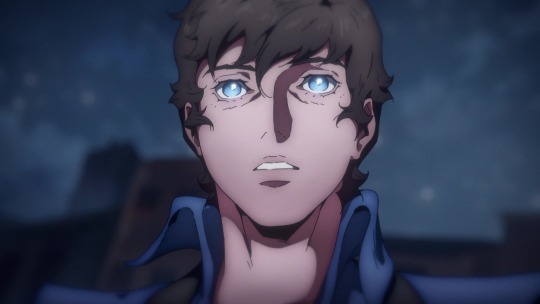
But honestly, the reason might not be anything particularly deep nor special either. It could be as simple as the fact that she’s just a girl who laughs at his lame ass jokes.
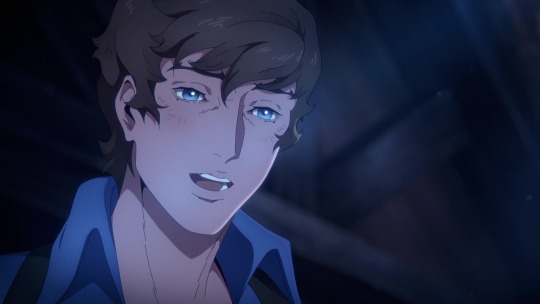
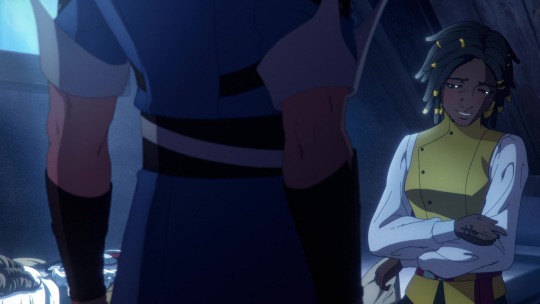
Annette: I knew you would be back. I was more concerned than I wanted to be. Richter: Oh. The muscles, huh?
Consistent with the themes of what it means to be a Belmont -- sure you get the champion the great heroic achievements of defeating foes, but alongside are the burdens/responsibility of carrying the Belmont legacy.
Richter didn’t believe in anything. Not in this damned revolution, not in utterances committed by pious idiots in the name of some God, and certainly not in any destiny beholden to him as the last descendant of the Belmont clan.
This perennial fear of dealing with sacrifice, loss, and grief that spans multiple generations (see: @aquilaofarkham's analysis, Dying Has Never Frightened Us Intergenerational Trauma, Healing, & the Burden of Legacy in Castlevania). I think this is the most compelling theme that Richter will always have to contend with. What will be the inevitable outcome of his own personal destiny? Is he just going to continue to fight, killing foes until one day he encounters a foe he is unable to vanquish, meeting his own end?
Personally, I wasn’t exactly 100% satisfied with the conclusion the show seemed to draw -- Richter realized he wants to protect people he loves, and that’s the source of why he got this magic back. I think what would feel more complete, to enable this full realization of his character arc -- he’s letting himself feel, by acknowledging that he cares for something -- or someone -- on a deeper level. Finding his purpose again is synonymous to finding something to believe in. Richter had lost something so deeply precious to him (his own mother, his own beliefs/ideals), but now that he’s found something precious to him again, he wants to hold onto it. Despite having experienced your world shattering before your eyes, you still want to hold onto any hope, any belief -- protect it dearly, because now you know just how fragile and precious another’s life is, how easily you can lose it just like that. That despite this ubiquitous fear, he still wants to hold onto this temporal moment between them, to hold onto her.
Because the truth is, Richter and Annette might not have a happy ending. Whether he might not be able to protect her, or if Annette leaves him to return to Saint Domingue. That despite all the fears swirling, hanging over his head -- whether fear of dying, fear of failing to protect loved ones, fear of his inevitable destiny/outcome, fear of not living up to the Belmont legacy -- whatever it may be, it would be more compelling that even knowing all this, Richter is still willing to take this leap of faith, this plunge.
Richter held onto her so tightly, cradling her head in the palm of his hand as she tilted back in shudders, her eyes flickering towards the heavens. Holding onto what he had to come to realize what he held so dear. Holding onto what he had come to realize what exactly it was he wanted to protect. Because he had finally found something he wanted to believe in.
Regarding the ending line -- What does Richter want to believe in, that he desperately realized he wants to protect? Well, I left that for reader interpretation. :)
Acknowledgments, Credits, and/or Further Reading
This is ramble actually just rehash, building from the groundwork of the following analysis of what others have already thoughtfully and elaborately laid out:
@aquilaofarkham / Hannah Richardson’s comprehensive analysis, "Dying Has Never Frightened Us Intergenerational Trauma, Healing, & the Burden of Legacy in Castlevania" of Belmont characters, both video game and show counterparts. | Google Doc | Ao3 | Tumblr --This essay is basically the backbone of this entire heacanon vomit.
@ifishouldvanish's tumblr post regarding Julia Belmont’s last words for the haunting fridge inspiration
@amaramiyu Amaramiyu’s tumblr post where she highlighted little details in the nuances of Richter and Annette’s interactions
And lastly, a huge thank you to YOU, from the bottom of my heart if you've managed to somehow read all of this! Either by reading this (or if you end up checking out This Distance Between Us), I hope Richter begins to endear you in your heart, just a little, and you will continue to cheer him on in his journey to assume the Belmont mantle.
Cheers! - Shingie
32 notes
·
View notes
Text
Of course I cried (a TBB S1 Retrospective and cry fest)
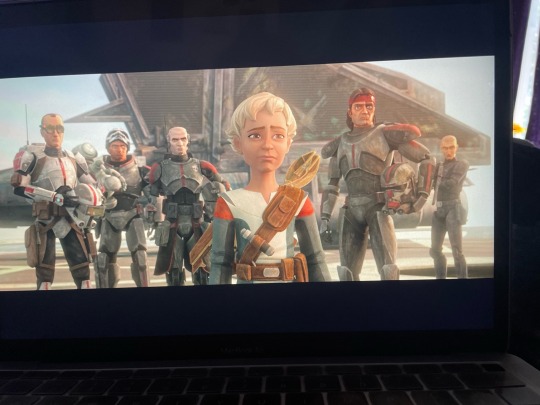
I finished S1 and it honestly is still stands really strong. While I love the other seasons more (for quite obvious reasons), S1 still has really standout moments and episodes such as the finale. Crosshair might be in is bad boy era, but he's still incredibly compelling.
What hurts to me most about S1 is this image above. This is the last time CF99 is all together. Ever. Obviously, we didn't know that and neither did our boys and Omega. Even if the Batch knew in-universe there was a chance that they would never see each other again, I think deep down they hoped they would reunite. I know Omega had hope that Crosshair would somehow find his way home.
What makes S1 (and the whole show in retrospect) even more tragic is that we will never see the BB whole ever again. It makes Tech's death hurt that much more because he and Crosshair never made proper amends. The last thing he hears Crosshair talk about is how everyone else is foolish for not joining the Empire and making his choice to stay. One of the last memories Crosshair really has of his brother is him pointing his blaster at him. After that, it's a one way ticket to suffering for Crosshair.
I know it's just a show, but images like the one above make me wish we had more time with the Batch before they were so cruelly torn apart from each other and it only enhances the tragedy they go through. The series finale, no matter how sunshiney it looks, is still bittersweet. The Batch finally get their freedom but at a great cost. Tech doesn't make it. Crosshair is still deeply hurting. It's a harsh reality that breaks my heart. In Rebels, we had 3 seasons of the Ghost crew together before we lost both Kanan and (temporarily) Ezra. The BB don't even get a single season all together. I would've loved to see them all with each other at least one more time without all the conflict.
But looking at S1 as a whole in general, I still really enjoy it. I love episodes like "Common Ground" or "War-Mantle" because we see how monstrous the Empire really is right out of the gate. Rampart, as goofy as that scream made him look, is a very crafty and entertaining villain who you just want to punch in the face. Crosshair himself is a fantastic villain who's both ruthless and tragic. While he doesn't hold back, the clear attachment he still has to his brothers in the back half of the season make the finale that much more emotional.
And while you can argue there is a lot of "filler," a rewatch proves that each episode happens for a reason. Why did the Batch have to capture a baby Rancor? So they could get info on Fennec. How come they stuck around to help Cid? Because she gave them money and work. I'm not saying that it's the most entertaining content we've seen, but there is a clear purpose for why those episodes happen.
I would've loved to see more Crosshair (for obvious reasons), but I do think the first season does balance out the story arcs well and when we do see him, he is always great. Thanks to the great music and acting from DBB, I do think the first season makes it clear that while Crosshair isn't leaving the Empire, he's not the same man he was pre-Bracca. The chip's influence isn't there (or at the very least severely diminished based on how you interpret Cross' reveal) and he does want them back but only on his terms.
As for the others, I definitely understand Hunter a bit more. He wants to help Crosshair, but he really doesn't know how nor does he want to endanger the others. I wish the group had a least one conversation about it though. For a group that feels like they should be very tight knit, it still feels like they brush Cross' departure off quite quickly. It's kinda like the Tech scenario in S3 where you know they're thinking about it, but nobody says anything. And that's frustrating because you know the Batch have a lot on their mind, especially Crosshair. And ironically, the quietist of the Batch is the most vocal about his feelings. Crosshair is so expressive and it's one of my favorite things about it.
Omega is such a cute munchkin. I adore her with every fiber of my being. She takes everything with stride and I love how S1 establishes many skills (like the hustling) that will later come into play in S2 or S3. And the show isn't afraid to show her learning process. Omega makes many mistakes, but she learns quickly and tries again. She loves her brothers so much.
Overall, S1 is still very strong and much more tragic in retrospect. I guess in someways, it reminds us how unfair life can be sometimes and that's why we gotta cherish each moment. Tech might no longer be with us, but he lives on through each of his brothers and Omega. Cross might never see him again, but as he tries to be better, Tech is no doubt smiling down from Clone Heaven.
Anyways, onto S2 (and more sadness). TBB lowkey is the most tragic of the SW animated shows not counting the Siege of Mandalore arc in CW. Every season, something awful happens to tear our little clone family apart. That's why the ending on Pabu, no matter the quality of writing, meant so much to me.
#star wars#the bad batch#tbb crosshair#tbb omega#tbb hunter#tbb wrecker#tbb echo#tbb tech#tbb rewatch#tbb s1 restrospective
36 notes
·
View notes
Text
i'm in the middle of dressrosa rn, i recently learned that doflamingo is a former celestial dragon and just now that the reason he still has sway in the holy land is because they're scared of him, they already tried to kill him to shut him up and he just didn't die, he has blackmail on the most powerful people in the world.....
this guy survives (and thrives) entirely just by being a huge annoying scary piece of shit who has dirt on everything and connections with everyone that keep him suspended, over like a metaphorical pit of lava, in a tangled web of cruelty and abuse and lies and fear and control. i have 400 episodes to go and i don't even feel like i'm jumping the gun by saying he's the most evil character in the whole series. i don't even like to call characters "evil" if the source material has proven it's capable of nuance about these things, which i think one piece is. but mr. flamingo is like EVIL evil. it's awesome
i think for as much as this series loves to portray good and just monarchies, and dances around fully condemning oppressors, etc. it still does a good job creating compelling and realistically corrupt systems of power. doffy isn't evil as shit for no reason, it's because he was conditioned from birth to believe he's superior to everyone, and he interpreted hatred from common folk as humanity being inherently cruel, so he does whatever he wants and resents everyone who thinks they can take his power away with the fury of a thousand suns, and is a pest for everyone all because of what he used to be, and the power that still affords him, because the whole system is fucked!!!! his evil is rooted so deeply in the already established worldbuilding
i'm also really liking fujitora he's so interesting and i can't wait to see what he does. introducing him in this arc specifically was a great move. it feels like he really finally understands the endless cruelty that people like doflamingo are allowed to inflict on civilians with the world gov and the marines being as they are
#AND I BARELY EVEN KNOW WHAT HE DID TO LAW YET#not a screencap#dressrosa#been busy it's the holidays lol#i will return to posting mediocre screenshots very soon#liveblog
19 notes
·
View notes
Text
ɢʜᴏsᴛs ᴄʜᴀʀᴀᴄᴛᴇʀ ᴀɴᴀʟʏsɪs/ɪɴᴛᴇʀᴘʀᴇᴛᴀᴛɪᴏɴ ᴘᴛ. 1
----
I started this with a small insight into a Thor character analysis, and someone from the Discord server wanted more, so I'm posting this here :))
Part one is Isaac, because I have the most to say about him.
! PLEASE UNDERSTAND !
This is simply my interpretation of the character- I'm by no means saying this is canon or that this is definitive to their personality. I include headcanons, opinions, and fill in a few blanks and crinks I believe the show somewhat leaves behind.
I wrote this very late at night, so forgive me if this is at any point incomprehensible or repetitive :((
Isaac's character and his 'arcs' have been swinging every which way (one point he acts like he's reforming and learning from his actions, just to relapse COMPLETELY the next episode, the show ignoring any progress he may have made -it pisses me off tbh) so I'll try to make this as cohesive as possible.
First and most obviously; his sexuality. This is kinda rough, because he seems to go back and forth between being confident with it, and accepting of himself, to insecure and uncomfortable with anything regarding it. It obviously started with denial- the internalized homophobia just simply came with the time period he's from (this also plays into another issue he has, but we'll get to that) and eventually, as he realized his sexuality and his feelings towards Nigel, he obviously wanted to act on it- he wanted that romantic connection he was never able to feel with anyone before, but he didn't realize that's what he wanted. I personally see Isaac as Asexual- which is a pretty common sentiment among the fandom, and the way the show portrays his repulsion to sexual topics being brought up, or heaven forbid, sexualizing himself (aside from the stripper scene, but I think that was a mixture of physical, aesthetic attraction, and Dinosaur nerding out than it ever was truly sexual attraction) BUT every time he attempts to reach out romantically- what HE perceives as romantically- it's always sexual in some sense, not really romance, even though that's what he craves. (I'm not sure I'm explaining this well it's really hard to word)- He WANTS a true romantic relationship, but he believes he HAS to be sexual in order for that to happen (as seen by his "move" on Hetty, which again, we'll get back to) even though he's uncomfortable or even outright disgusted by sexual act. Whether this is because he's still uncomfortable with his sexuality, or simply because he's not interested in sex, doesn't really matter- because either way, it eventually leads him to decide if a romantic relationship means sexual act (which wasn't helped by Nigel's eagerness and horniness- but that's not necessarily Nigel's fault) then maybe it wasn't a romantic relationship he really wanted after all. This leads to the break up and all that- and it may be proven completely wrong with all the Chris issues coming up (and the strange "I miss physical touch" comment Isaac made?? Which didn't make sense to me??) Like I said, it feels like the writers are trying to go a million different ways with his character all at the same time- it makes it simultaneously annoying and super fun to analyze him.
Now that that's out of the way, we can talk about his people pleaser complex..? If you'd call it that. Another annoying aspect of his character- he seems to either be really self centered and assured, or again, super insecure and wants people to like him- which I guess can coexist, but it's such a specific mental space to be in that it makes it seem unrealistic. A lot of his insecurity came from his sexuality as well- he spent so long trying to convince himself and others he was a 'normal' straight guy, and that may have contributed to everyone's adversion to him- or he was simply a lil weirdo- but either way, others in his life didn't think highly of him and weren't afraid to act as such- which led him to the people-pleaser mindset. Either 1) He acts like he's better than everyone else because he thinks doing so will make others think he's better than they would normally consider him (basically trying to convince them he's cooler than he is) or 2) The writers simply cannot tell if they want him to be egotistical or insecure. Yes, he can be both at the same time, but that's such a complicated personality point - especially compared to the others - and they don't really seem to be doing a good job portraying it in my opinion.
Anyway, this people-pleaser mindset forms a comphet mindset, and that leads to his "move" on Hetty- attempting to suppress who he is, in an attempt to be a person he thinks people want him to be. Then, when he finally accepts his sexuality as a part of himself, he opens up in a rare admission of vulnerability, and then the next episode completely deflects this vulnerability by returning to an arrogant, egotistical persona. This would be a great way to portray a character who struggles with simple forms of intimacy and exposing his 'weaknesses' so to speak, except.. They completely forget about it by the next episode. It turns into a joke. Which, yes, makes sense, but it makes it hard to take his character seriously, or see him as anything other than an arrogant asshole because these moments of vulnerability are completely overshadowed and moved past. His yearning for validation also forms in his efforts to "make history". He doesn't want to be famous, he wants to be liked. He wants people to know him, and like him- and because the people in his life never liked him, he wants to make that happen by putting his name out there and maybe the people who learn about him through history (his book) would like him better. That also plays into his hatred for Hamilton, even if the guy was only 19 while Isaac was 35, Hamilton was liked- people found him charming, and effortlessly so, while Isaac worked so hard to be likable, and still couldn't get people to stop giving him weird looks and scorn. Especially so when Isaac experiences how much of an asshole Hamilton can be.
All in all, Isaac wants to be liked. He wants to be well known and well liked, but he also craves to be himself- he wants to accept his vulnerabilities and sexuality as is- but he doesn't believe those two options can coexist. He thinks people won't like him if he's himself - He was terrified to come out to Hetty in fear of rejection and scorn, and this same mindset led to his break up with Nigel. Isaac didn't want to find something "new and exciting" - hell, I don't even think he was scared of being "stuck" in another loveless marriage. He was scared of trapping Nigel. Trapping him in a situation where he wouldn't be happy- in a relationship where Isaac couldn't give him what he needed, because Isaac believes (due to multiple external influence) that relationships need to progress constantly - as well as the fact that romantic relationships = sexual relationships, and that's one thing Isaac can't force himself into to comply with what others want him to be. He also couldn't simply talk about this with Nigel, because Isaac struggles to accept the fact that others can accept him for who he is- and thinks if he goes 'belly up' in this relationship, exposing those vulnerabilities that made him such an outcast in his living life, Nigel would hate him too- and he would rather 'intentionally' make Nigel hate him, rather than Nigel simply hate him, right?
I wish I could say I know how the show is going to take this, but like I've said they're so up and down with Isaac's progression and personality that it makes it hard to tell. And, like I said, I could completely change my mind about all of this in the next few weeks, but this is how I interpret his character right now. In an ideal world, he would express his feelings to Nigel- how he feels about sexual acts, or simply explain how he views relationships as a whole. Maybe use a Nigel/Chris revenge sex plot point to have Isaac confess something along the lines of "Glad you found someone who can do that for you"/"Sorry I couldn't do that for you" to prompt the conversation and get Nigel to tell him how Isaac's wrong about how he'd react to that information- something like that. It'd end with him both 1) Fully accepting his sexuality in a relationship that's romantic, just as he craves, and not sexualized and 2) accepting that people will like him for who he is, and that he doesn't need to deflect these vulnerabilities and act like a completely different person in order to get people to like him. I think that would leave him satisfied enough that the book doesn't matter- especially because it seems to be getting further and further away from his initial goal of "biography turned big hit" to get his name out there, kind of an acceptance of "the people who matter are the ones who care," yeah? I'd think that'd be enough to see him sucked off :))
10 notes
·
View notes
Text
I will say visavis Dean and communicating about his feelings like. If you are viewing the show through a destiel lens you will be naturally inclined to view Dean as someone who keeps his feelings bottled up because there is a massive unspoken Thing between him and Cas. And I think that puts a thumb on the scale, like that's not the only reason why that could go unacknowledged it's just the more common fanon interpretation right now.
But at the same time I think the show clearly wants us to think about Dean as someone who fails to talk about his emotions, it's just that like. It's a tv show, and this trait is being introduced to be mined for drama. When Dean is shown refusing to confront or talk about his emotions, by the end of the episode or at most by the end of a two or three episode mini arc he's gonna break down and talk about his emotions. Bc that's how we get resolution as an audience, but like the build up to that resolution is Dean displaying reticence that we are meant to understand as characteristic for him. Also like. Obviously we always see the emotional resolution bc it happens on screen but the characters allude to the days and weeks between episodes where things are Not Talked About and previous attempts to Talk About Things that were rebuffed. The fact that the show focuses on all the moments og high drama where someone is pushed past their limit and all their emotions come spilling out is like, the nature of television not an indication that these characters are predisposed to emotional honesty.
All that said I dont think Dean is significantly worse about this than any other character. Cas will say as few words as he can get away with and he and Jack both hide the fact that they are dying as a hobby. Sam asks everyone else to talk about their emotions please so he can pretend he is not having any. This is a guys talking about their feelings show, in order for that to be actually interesting they have to be bad at it and fight tooth and nail not to and then be forced to be vulnerable anyway. Thats drama baby
#spn#Im like not trying to citw authorial intent or anything but I am kind of like#yes if you see a guy characterized as not talking about his emotions#having to break down his walls and talk about his emotions#and then see that plot repeated one hundred times over fifteen years#you can start to think#what are you talking about this guy talks about his emotions all the time!#And like you're not wrong#but also that's like an unintentional side effect of recycled drama yknow#not a deliberate piece of characterization#which doesnt mean you cant run with it#that's most of what we do here#but I just think it leaves the whole thing a bit more open to interpretation
33 notes
·
View notes